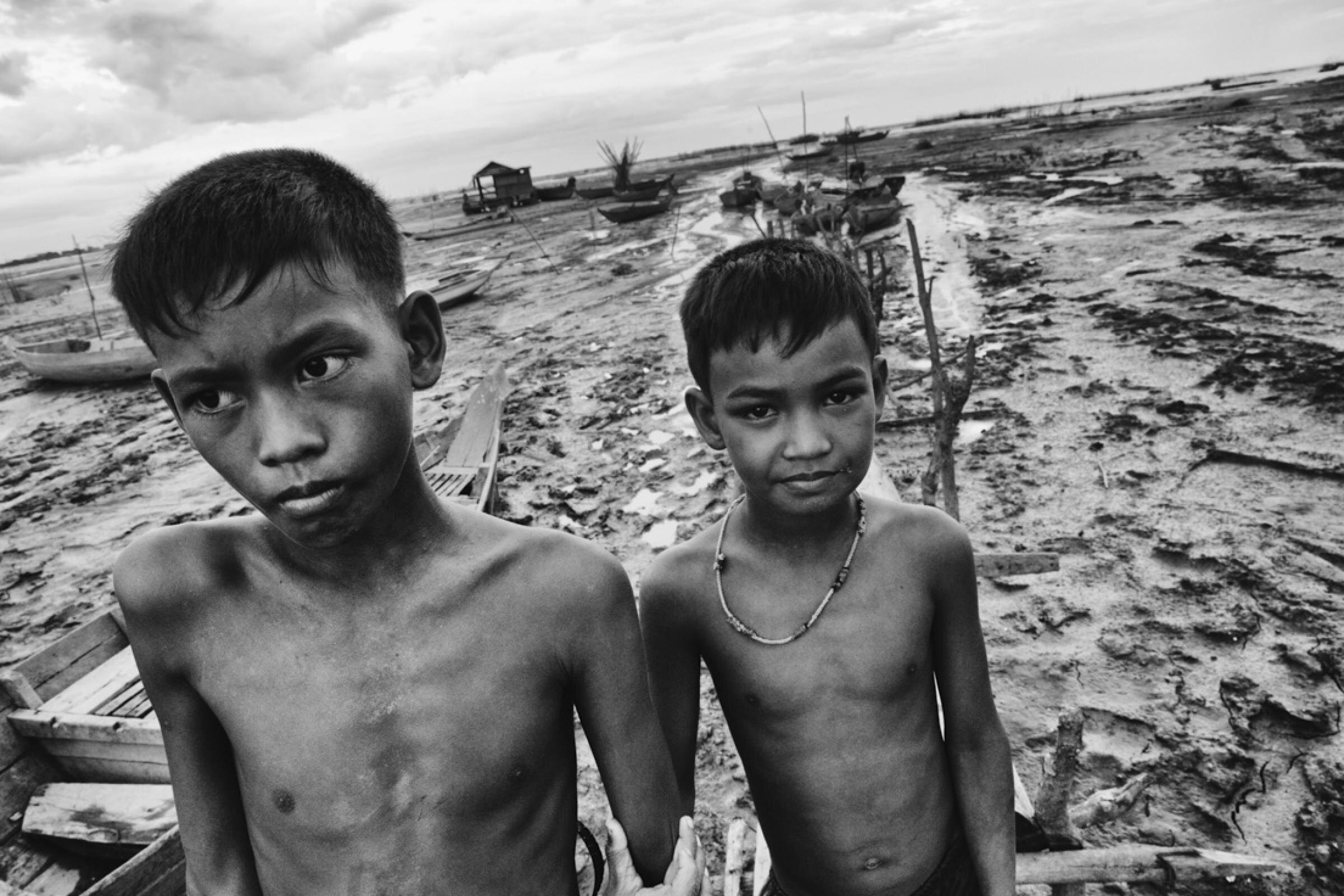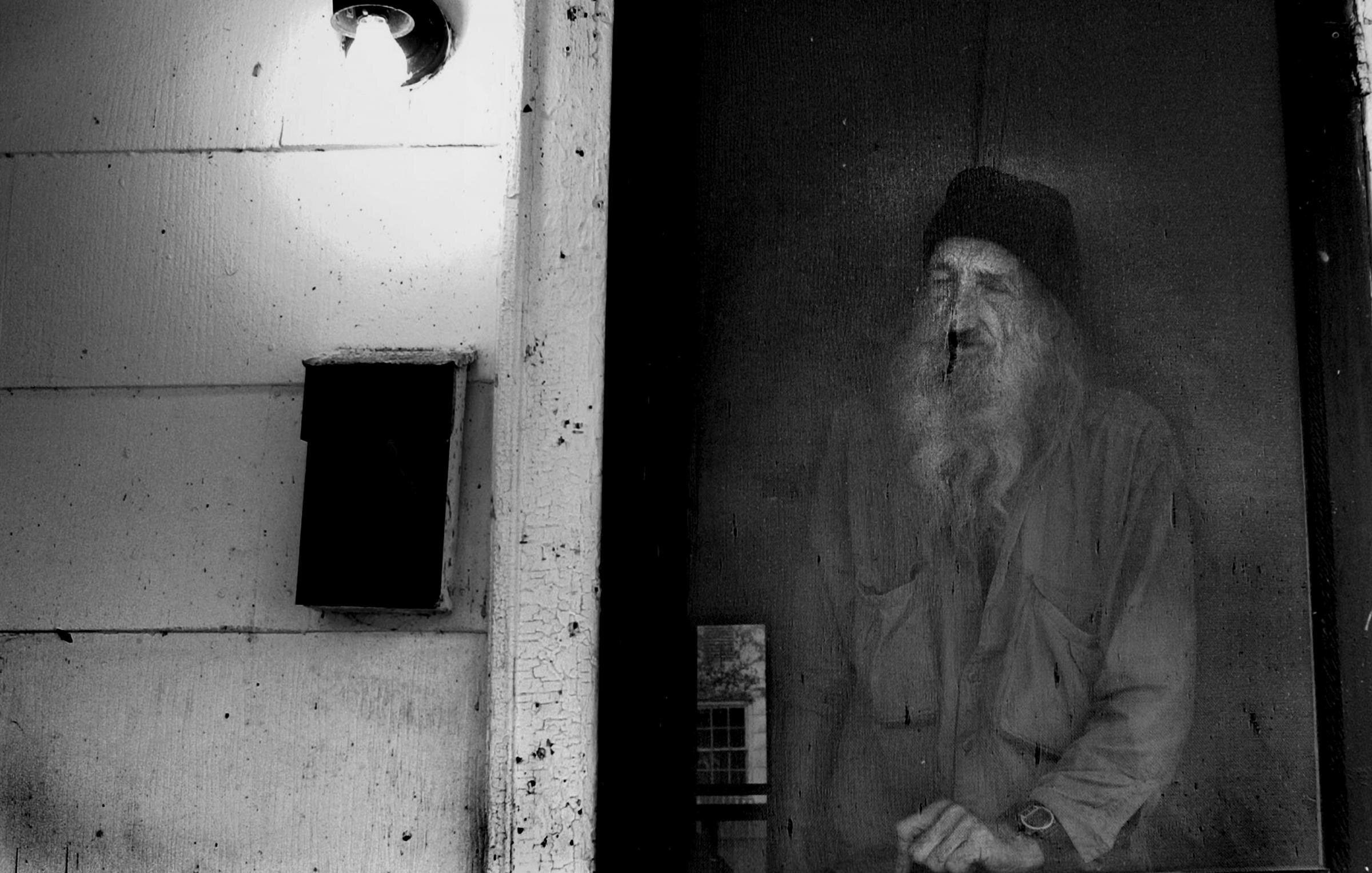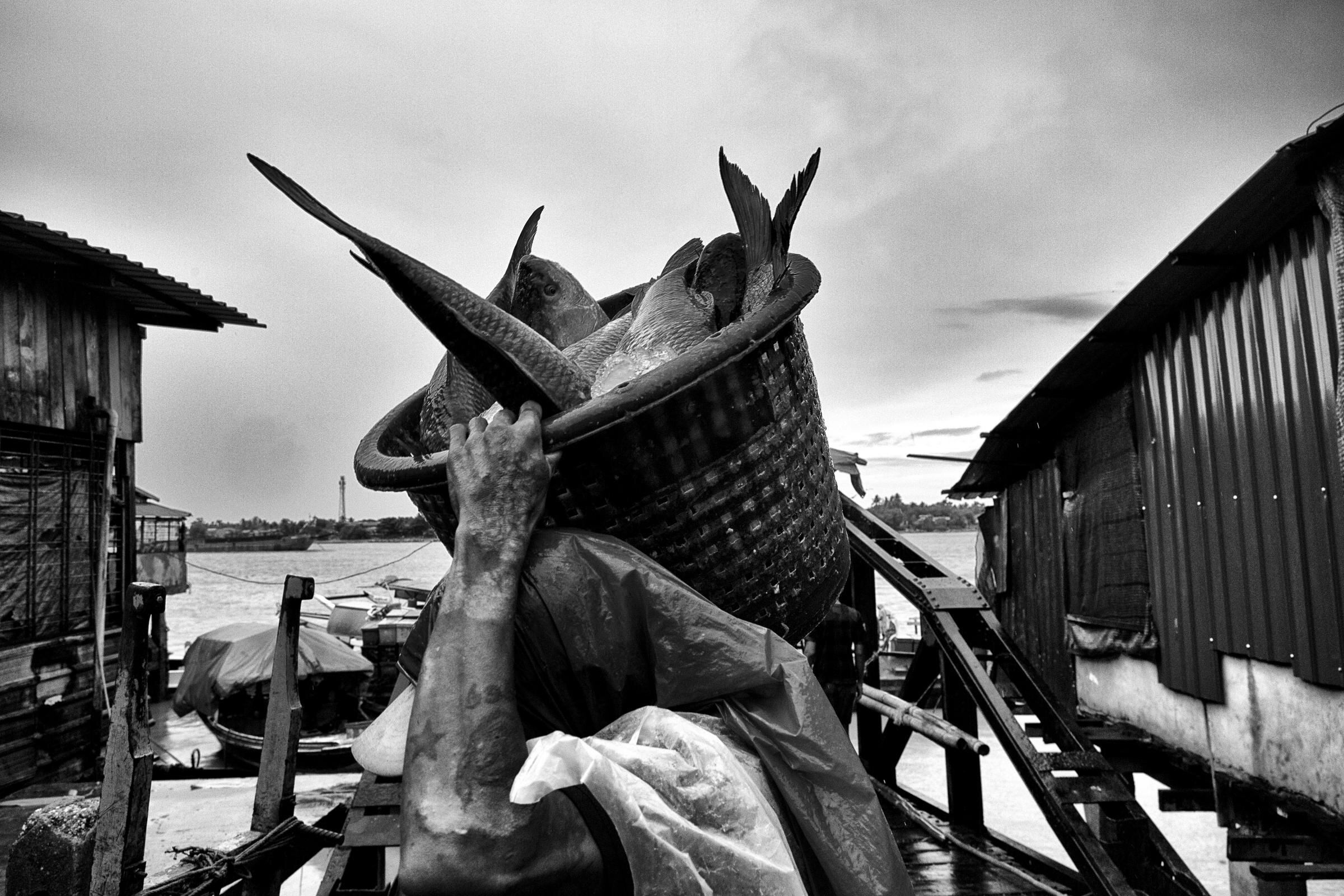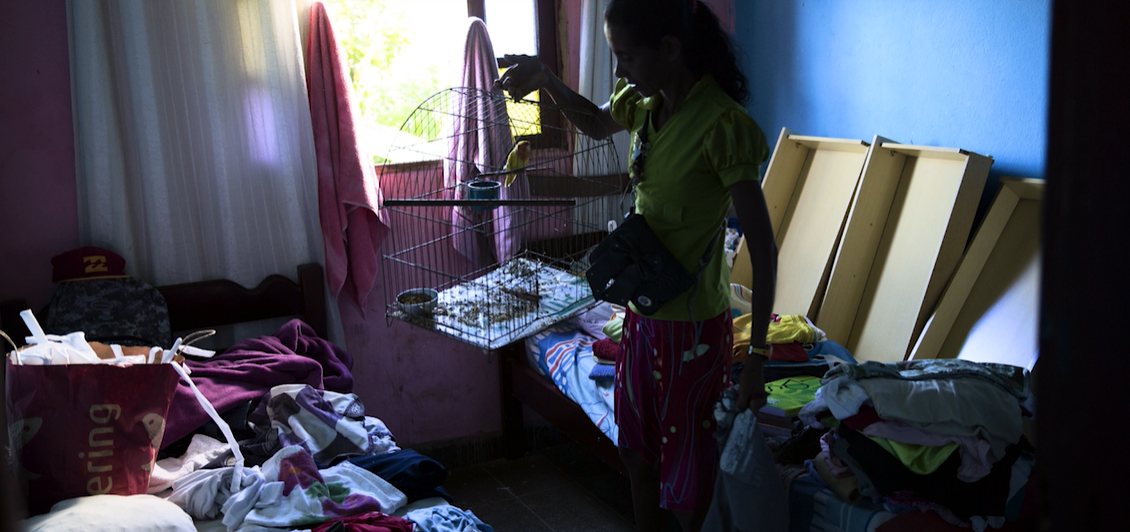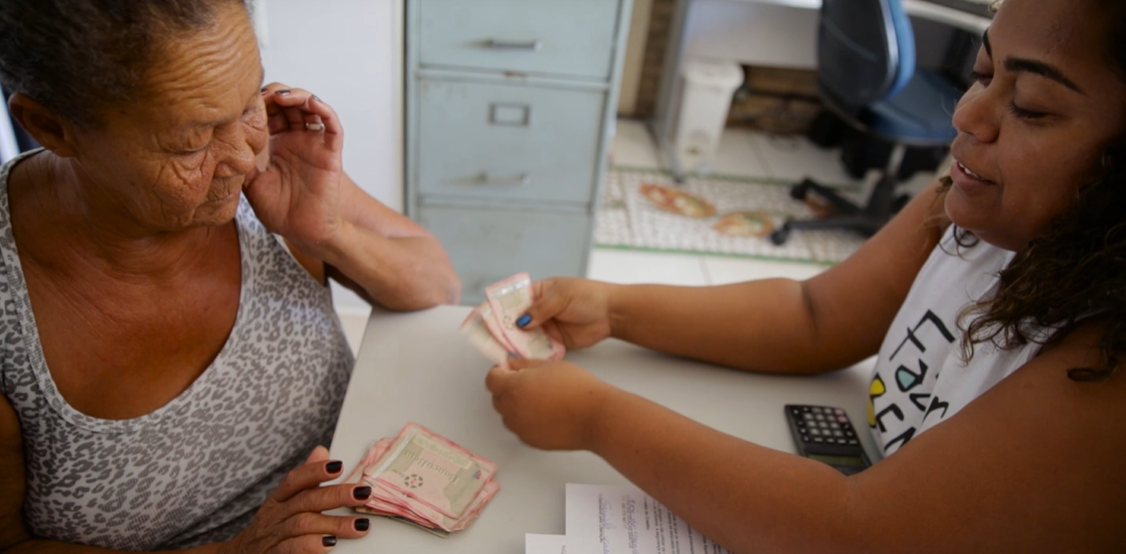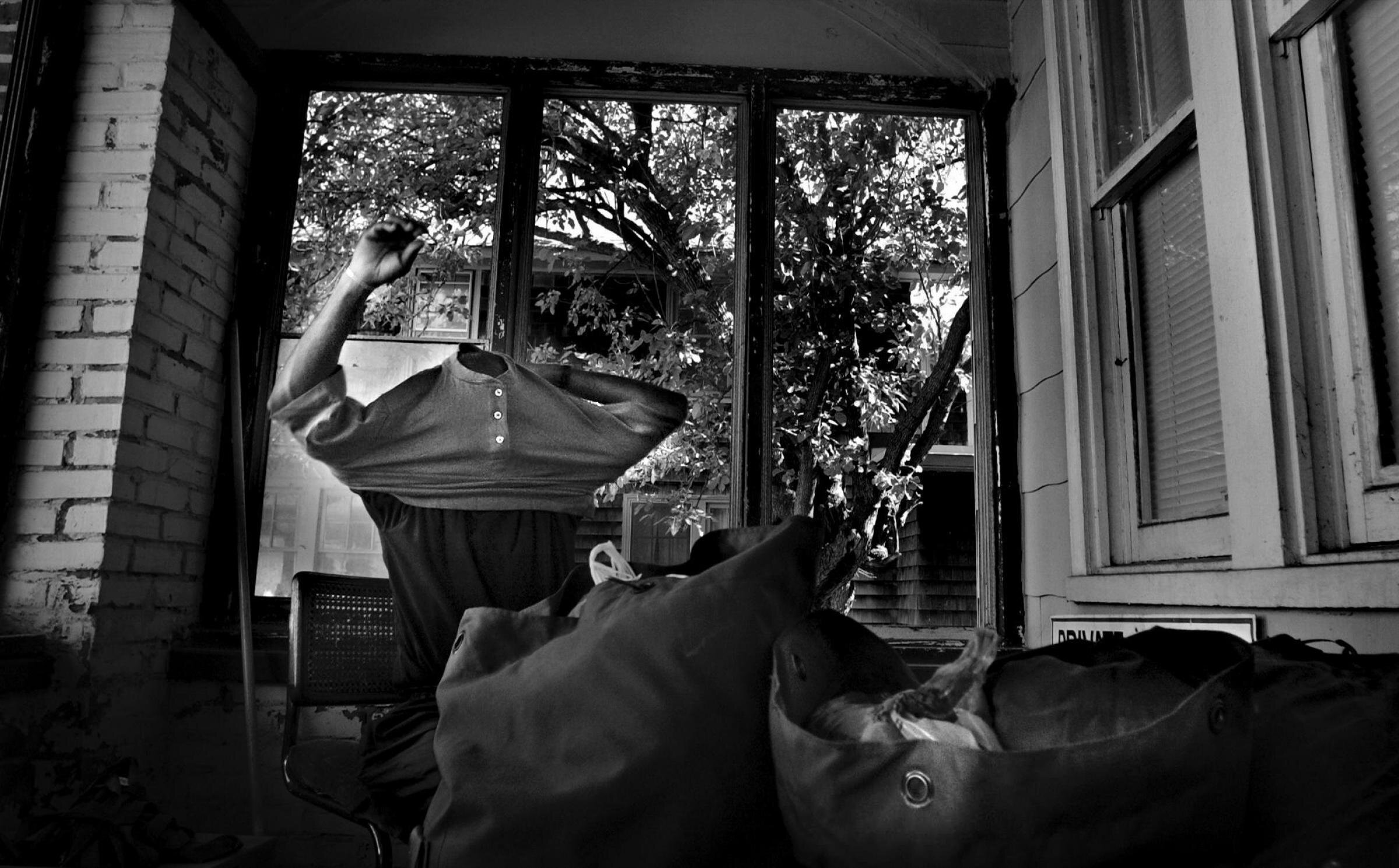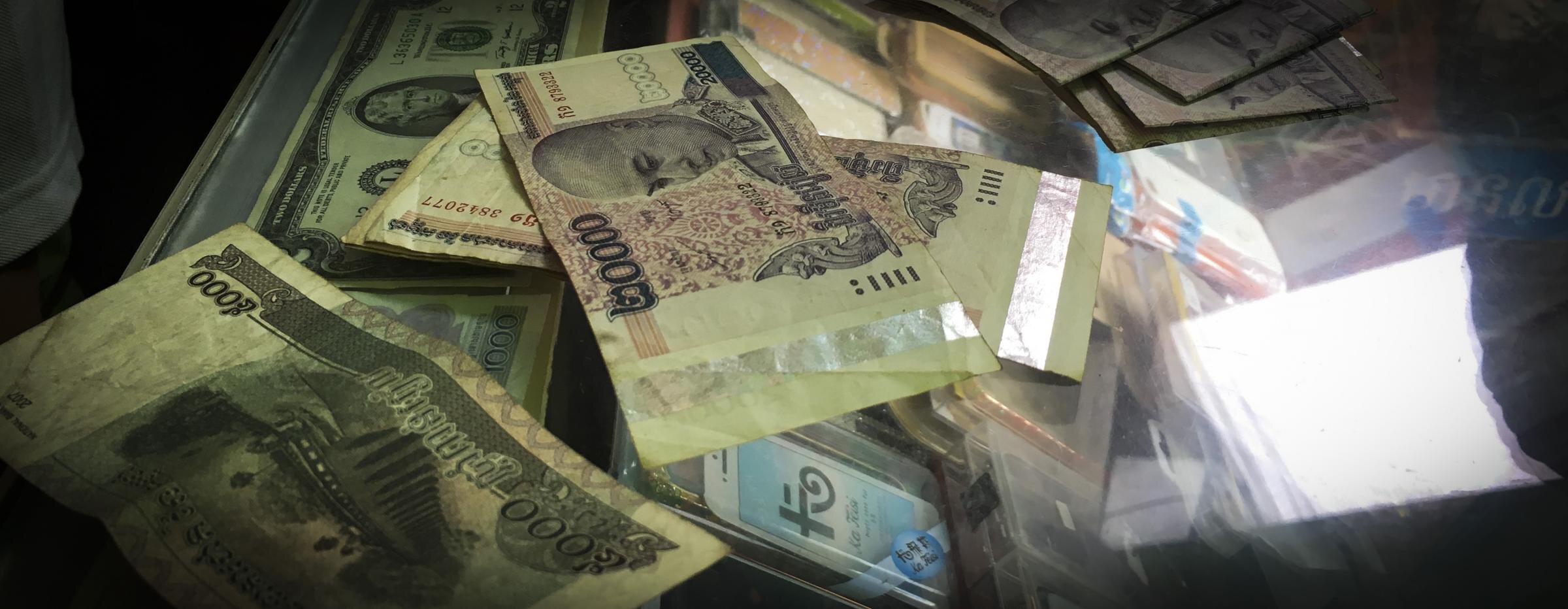
Financial Shock
A World Teetering on the Financial Edge
An Investigative Report By: Chris Tyree, Journalist, Email and Scott Wallace, Journalist, Email
CHAPTER 1
THE BIG QUESTION
CAMBODIA. BOYS COME TO SHORE AFTER PLAYING ON FISHING BOATS BEACHED ON THE NORTH SHORE OF THE SPRAWLING TONLÉ SAP LAKE. A PROLONGED DROUGHT HAS CONTRIBUTED TO LOW WATER LEVELS AT THE LAKE, LEADING TO A DROP IN FISH PRODUCTION AND DEEPENING DEBT FOR FISHING FAMILIES, WHO MUST BORROW MONEY AT HIGH RATES OF INTEREST TO MAKE ENDS MEET.
In order to improve global economic equality, and even lift whole populations from poverty, international financial experts and banking institutions are pinning their hopes on something called “financial inclusion.” They want to extend formal and regulated financial tools — such as bank accounts, credit cards, mobile money, and insurance — to the two billion people around the world who still do not have access to such services.
Economists at the World Bank and other international institutions assert that access to such services plays a critical role in alleviating extreme poverty, providing economic stability for individuals, families, communities, and countries. They say it facilitates investment in education, adequate nourishment, improved health care, and even starting or expanding a business. In theory, someone who is financially included would also be well equipped to face and manage a financial emergency when it arises.
In 2014, the World Bank commissioned a survey, called the Global Findex, to take measure of the financial health of people and countries worldwide. Among the questions asked were a set that focused on whether respondents would be able to access money in an emergency, and if so, how. For those who said they would be able to find the money, family and friends were cited as the most common source, followed by personal savings.
Data analysis is a big part of our unique reporting process at Orb. For this story, we correlated four variables — level of education, income, gender, and participation in the formal financial structures — with one’s ability to find emergency funds. By aggregating those correlations at the country level, we estimated what proportion of respondents from each country would likely be able to come up with emergency money. We then compared those numbers to actual responses in the Global Findex. That enabled us to find those countries with the largest discrepancies — where the predicted results differed most markedly from the actual responses. Based on what we learned, we selected four countries — Brazil, Cambodia, the United States and Myanmar — to look more closely at how people cope with a financial emergency. In doing so, Orb developed a unique lens through which to view and evaluate the efficacy of financial inclusion as an instrument to support financial resilience and alleviate extreme poverty.
It really doesn’t matter who you are or where you live; the question isn’t if you’ve faced a financial emergency but when — and when you did, how you managed it. Some describe it as the hardest times they have faced in their lives — a moment that challenges us as individuals both financially and emotionally.
USING ORB’S PREDICTIVE MODEL AND COMPARING THAT TO THE ACTUAL RESPONSES FROM THE 2014 GLOBAL FINDEX ABOUT THE EASE OF ACCESSING EMERGENCY FUNDS, ORB WAS ABLE TO HIGHLIGHT WHERE CHALLENGES AND GAPS MIGHT EXIST WHILE EXPLORING SOME POSSIBLE SOLUTIONS.
FINANCIAL SHOCK
HOW ABOUT YOU?
CHAPTER 2
THE FINANCIAL EDGE
USA: KAREN OLIVER WATCHES AS HER COUCH IS CARRIED AWAY AFTER SHE SOLD IT TO HELP PAY MEDICAL EXPENSES FOR A FAMILY MEMBER.
FINANCIAL SHOCK
Karen Oliver, 60, nestles into the comfort of her beige couch one last time. In 15 minutes, a young woman and her boyfriend will carry it out of Karen’s townhouse in West Arlington, Virginia, an affluent suburb of Washington, DC. Karen will use the USD$200 she receives from the sale to help her aging mother pay medical bills.
By every measure, Karen has done well. She has a secure, high-paying job in the U.S. federal government. Over the years, she built up a nest egg of savings while also saving for her retirement. Yet, here she is, selling off her household belongings.
Why? Because Karen was ill-prepared to take on the financial responsibilities of family members who were not as conscientious. In effect, she’s become the money lender for the rest of her family. As a result, her savings have dried up. Now she’s selling off assets to pay for things her salary will not cover. An emergency of her own, like an accident or health crisis, could put her over the financial edge — even after all her years of good planning.
While financial emergencies are often the result of health or medical problems, they can also be triggered by being laid off from your job, losing your livestock, or experiencing a costly but necessary repair to your home.
Global Findex respondents were asked if they would be able to find a certain amount of money within 30 days to combat a hypothetical emergency. Only 31 percent of Global Findex respondents said it would be very possible or somewhat possible to find money if they faced a financial emergency; 22 percent said it would be impossible. Clearly, we as a global population are teetering on the edge.
THIS GRAPH REPRESENTS THE GLOBAL RESPONSES TO THE 2014 FINDEX SURVEY.
WHERE TO TURN
Respondents were then asked a follow-up question: “If you could get the money, where or how would you get it?”
Thirty-eight percent of those who said they are financially prepared for an emergency said they would turn to family or friends and 35 percent indicated they would dig into personal savings. Others cited a range of other sources: salaries, advances from their employer, credit cards or loans from a private lender, pawnshop, or formal institution.
The insight that emerged from conducting the Global Findex survey paved the way in 2015 for a World Bank initiated project called Universal Financial Access 2020 (UFA2020). The program seeks to provide adults everywhere with access to formal accounts and transaction services, with a focus on 25 specific countries where 73 percent of the world’s remaining two billion “unbanked” people reside.
Banks, credit card companies, microfinance institutions, multilateral agencies, and telecommunications companies have joined UFA2020 to execute the strategy with the goal of bringing those two billion unbanked into the financial fold.
Says World Bank Group president Jim Yong Kim: "Access to financial services can serve as a bridge out of poverty. We have set a hugely ambitious goal — universal financial access by 2020."
However, over the course of Orb’s reporting on how people manage financial emergencies, we began to wonder whether providing access to those financial services is — in and of itself — as strong an instrument for lifting people from poverty as its proponents assert.
A BANKING THEORY
TRIGGERS
BRAZIL. A HOMEOWNER CLEANS UP AFTER A FLASH FLOOD ENGULFED HIS HOME IN THE SHANTYTOWN, OR FAVELA, OF PREVENTÓRIO OVERLOOKING RIO DE JANEIRO. THERE IS NO INSURANCE FOR HOMES IN THE FAVELA AND NO ACCESS TO GOVERNMENT SOCIAL ASSISTANCE.
CAMBODIA. HOM HAN SITS WITH HIS DAUGHTER, HAN SREY VIN, AS SHE RECEIVES AN IV A DRIP AT A PRIVATE CLINIC NEAR THEIR FARM IN KOMPANG CHHANG PROVINCE. SHE WAS BORN WITH POLIO AND SOMETIMES HAN DOESN’T HAVE THE MONEY TO COVER THE COSTS OF HER TREATMENTS. WHEN THAT’S THE CASE, HE BORROWS FROM FROM LOCAL LENDERS AT HIGH RATES OF INTEREST. IN A GOOD GROWING SEASON, HE CAN PAY THEM BACK PROMPTLY.
MYANMAR. IN THE IRRAWADDY RIVER DELTA REGION, A FARMER REFLECTS ON A TIME WHEN SHE NEEDED TO GET A LOAN FROM THE LOCAL MONEY LENDER IN HER VILLAGE.
MYANMAR. SITTING IN FRONT OF BILLBOARDS PROMOTING MYANMAR’S PROGRESS, A YOUNG WOMAN SELLS CORN ON A STREET IN YANGON FOR PASSERSBY TO FEED PIGEONS. MYANMAR RANKS LOW ON GROSS DOMESTIC PRODUCT (GDP) GLOBALLY, AND A SMALL PROPORTION OF THE POPULATION PARTICIPATES IN THE FORMAL BANKING SYSTEM, YET ITS CITIZENS SCORE HIGH FOR THEIR ABILITY TO GET MONEY IN A FINANCIAL EMERGENCY.
BRAZIL. MARCOS RODRIGO FERREIRA, LEFT, PRESIDENT OF BANCO DO PREVENTÓRIO, A COMMUNITY BANK OUTSIDE OF RIO DE JANEIRO, LISTENS TO RESIDENTS TALK ABOUT HOMES THAT WERE DESTROYED IN A MUDSLIDE THE NIGHT BEFORE.
UNITED STATES. DANIELLE BAILEY, 3, TIPS HER BOWL BACK TO GET THE VERY LAST DROP OF MILK FROM HER DINNER OF CEREAL. HER FAMILY STRUGGLES WITH FINANCIAL SHOCK BECAUSE HER FATHER LOST HIS JOB.
UNITED STATES. JOHN SMITH, HIS WIFE DEANA, AND CHILDREN RYAN, 8, AND BRANDON, 4, ARE HOMELESS AND STAYING AT A HOTEL IN MARYLAND. JOHN HAD BEEN INJURED ON THE JOB AND FORCED TO GO ON PERMANENT DISABILITY. HE LATER SUFFERED A NERVOUS BREAKDOWN, FOR WHICH HE WAS HOSPITALIZED. MOUNTING MEDICAL BILLS FORCED DEANA AND THE KIDS TO LEAVE THEIR HOME. FOR A TIME, THEY WERE LIVING IN A VAN. DEANA IS SEEN HERE ON THE PHONE TRYING TO GET THE FAMILY'S FOOD STAMPS REINSTATED.
MYANMAR. A CROW STANDS VIGIL OVER YANGON, MYANMAR. COMPARED WITH OTHER COUNTRIES, MYANMAR RANKS AMONG THE LOWEST IN TERMS OF CITIZEN PARTICIPATION IN THE FORMAL FINANCIAL SECTOR. YET, THE WORLD BANK’S GLOBAL FINDEX DATA INDICATES THAT MYANMAR’S POPULATION IS ABLE TO GET MONEY IN EMERGENCIES EASIER THAN ANY OTHER COUNTRY IN THE WORLD.
CHAPTER 3
OUT OF REACH
BRAZIL. BRAZIL RANKED NEARLY LAST IN TERMS OF ITS PEOPLE’S ABILITY TO FIND FUNDS IN AN EMERGENCY.
Several obstacles stand in the way of successfully achieving the stated goals prescribed by the UFA2020 initiative.
Improving access to formal lines of credit — one of the pillars of financial inclusion — can end up burying families under crushing loads of debt if not accompanied by controls on interest rates and financial education for consumers.
In countries such as Brazil and the United States, access to credit has led to skyrocketing debt among both the middle-class and more economically disadvantaged members of the population. Such debt threatens to undermine poverty reduction and it leaves people especially vulnerable to financial shocks. Even among the financially included, people are spending beyond their means and few are saving money. So when they need money to confront an emergency, they don’t have it.
UFA2020 and similar projects to “include” citizens in formal financial systems are largely centered around efforts to encourage individuals to save money safely in an account of some kind. It is believed that having such savings will improve people’s overall financial resilience. Yet, according to the World Bank, just 22 percent of the global population is actually saving at all — whether they have an account or not.
In addition, large numbers of people in many developing countries either live in remote regions where agriculture is the principal economic activity or in marginalized urban districts that lack traditional banking facilities that might allow them to harbor their funds safely.
Many of the world’s unbanked work in informal — or “gray” — economies where most transactions are conducted in cash. Because these jobs are “off the books,” these individuals lack official employment documentation that most banks require to open an account, making access to a bank account just one piece of the financial inclusion “puzzle.”
Finally, the reality is that most of us are financially illiterate. According to a recent survey by Standard and Poor’s, only one in three adults show a basic understanding of financial concepts.
RISE AND CRASH
BRAZIL. FAVELAS IN THE CITY OF VITÓRIA SIT IN STARK CONTRAST TO THE HIGH RISE TOWERS OF THE NEW MIDDLE CLASS.
The world’s two largest credit card companies, Visa and MasterCard, have signed on as partners in the UFA2020. Together, the companies are hoping to put credit and payment cards in the hands of more than one billion new customers. However, credit card debt remains a big concern among economists who embrace financial inclusion — especially in the wake of what has happened in places like Brazil, an early adopter of financial inclusion thinking.
As the economy in Brazil grew and a new middle class emerged in the early years of the new millennium, the Central Bank of Brazil (BCB) took its own initiative to bring more of the country’s unbanked into the formal financial sector. In 2009, the BCB launched a forum on Financial Inclusion in the city of Salvador. In a display of its commitment to these new efforts to bring financial services to its previously unbanked citizens, Brazil became a founding member of the Alliance for Financial Inclusion in 2010, a consortium of like-minded countries and their banking organizations trying to reach the unbanked.
As a result of these efforts in Brazil in 2014, 68 percent of adults reported to Global Findex surveyors that they have bank accounts or access to formal financial services. But, only 12.3 percent said it would be “very possible” to access money in an emergency. What’s most troubling? A whopping 44.2 percent said that they would not be able to come up with the money at all. How is that possible in a country that seemed to be moving in the right direction, with better access to banks and greater prosperity for everyone?
RIDING THE DEBT CYCLE
BRAZIL. SIGNS PROMOTING CREDIT CARDS ARE UBIQUITOUS THROUGHOUT BRAZIL. MANY PEOPLE USE ONE CREDIT CARD TO PAY OFF THE OTHER UNTIL THEIR CREDIT LIMIT IS MAXED OUT.
One of the main culprits is obvious almost anywhere you look in Brazil. Throughout the country, plastered on nearly every shop window, billboard, and signage are advertisements for credit cards.
In 2009, when the project to increase Brazil’s financially included population was launched, the middle class was growing, buoyed by higher wages and more job opportunities. People who had previously lived very sparingly were ready to spend on a more lavish style of living, too. Sensing opportunity, credit card companies extended their plastic to just about anyone who reached for it. But without either a meaningful financial education to understand how credit works or the tight regulation of interest rates, Brazil’s new middle class swiped its way to record-level debt, borrowing to pay for everything from televisions to toilet paper. The economy was growing and no one seemed to be thinking about what would happen when the bills came due. When they did, many cardholders defaulted. Interest rates skyrocketed. In September 2015, the average Adjustable Percentage Rate (which can fluctuate monthly) on credit cards reached 414.3 percent.
In fact, in the Findex, the majority of Brazilians cited revolving debt — using one loan to pay off another — as one of the main reasons why they could not access money in an emergency.
This lack of savings paired with the accumulated debt in both the United States and Brazil may be a cautionary tale worth heeding as a similar story is starting to play out in Myanmar, where more than 150 microfinance companies have set up shop in recent years. Farmers, laborers, and small business owners operating on very thin margins have taken out multiple loans from unregulated microfinance institutions. Many people have even signed over the deed to their home as collateral for these loans. If they can’t pay off their debts, these individuals and families could well lose the roof over their head.
Once a person becomes stuck in a cycle of debt, it becomes nigh impossible to save money. And, when a person who is paying astronomical interest rates has no more lines of credit available, if money is needed in a financial emergency the only option becomes unregulated, even predatory, lenders.
According to the World Bank’s Douglas Pearce, the UFA2020 partners have agreed to prioritize transaction accounts — accounts that can be used to make and receive payments and safely save money — in order to assure that financial inclusion brings true benefits to those it’s meant to serve. But greater access to credit cards and the presence of unregulated and even predatory microfinance companies in countries slated for expanded financial inclusion efforts could open the door to debt issues similar to those that have plagued Brazil. Microfinance institutions have joined Visa and MasterCard in the World Bank’s list of partners in the UFA2020.
UFA2020 PARTNERS
Universal Financial Access 2020 Partners and Commitments
| Partner Name | Partner Type | Commitment | Country Presence |
|---|---|---|---|
| Bandhan | Microfinance Institution | 20,000,000 Savings accounts 10,000,000 Credit customers | India |
| Bank Mandiri | State-Owned Bank | 50,000,000 Unbanked customers | Indonesia |
| Equity Bank | Microfinance Institution | 50,000,000 Unbanked customers | Africa |
| Global Banking Alliance for Women | Financial Alliance | 1,800,000 Unbanked Women | Africa |
| MasterCard Corp. | Payment | 500,000,000 Financially excluded adults | Global |
| MicroCredit Summit Campaign | Microfinance Association/Network | 53,000,000 Poor borrowers/families | Global |
| MF CEO Working Group | Microfinance Association/Network | 70,000,000 New accounts | Global |
| Ooredoo | Mobile Network Provider | 17,000,000 Mobile financial services subscribers | Algeria, Indonesia, Iraq, Kuwait, Maldives, Myanmar, Oman and Qatar |
| Pakistan Microfinance Network (PMN) | Microfinance Network | 50,000,000 Deposit accounts | Pakistan |
| State Bank of India | State-Owned Bank | 70,000,000 Customers | India |
| Telenor | Mobile Network Provider | 110,000,000 Customers to use their mobile phones for financial services | Bangladesh, India, Myanmar and Pakistan |
| Visa | Payment | 500,000,000 New electronic payment accounts | Global |
| WOCCU | Financial Cooperative | 50,000,000 New account holders (new members) | Global |
| WSBI | Financial Cooperative | 400,000,000 New transaction accounts | Global |
THE “GRAY” ECONOMY
BRAZIL. MOST RESIDENTS IN THE SHANTYTOWNS CONDUCT THEIR BUSINESS IN CASH AS PART OF THE INFORMAL, OR “GRAY,” ECONOMY.
Favelas flow up and down hills, around rivers and bays, occupying the most marginal lands around Brazil’s cities, both large and small. Millions of lower and middle class Brazilians call the favelas home. But the favelas all have something important in common: they lack traditional, brick-and-mortar banks. The same can be said about Brazil’s vast and far-flung rural regions. Especially in the country’s impoverished North and Northeast.
These areas are virtual banking deserts.
But Brazil isn’t alone. Banking deserts are something of a global phenomenon.
Banks rarely set up operations in shantytowns or remote rural areas — and for for-profit banks there are a host of good reasons. It costs a lot of money to build and staff a bank branch or financial office. If the clientele is rural and geographically scattered, you’d need to build more branches that would serve fewer people. Particularly in rural areas, poor transportation infrastructure means accessing them is laborious and they often lack adequate technology, which makes the transfer of money difficult. In some urban slums, security can be an additional issue. Additionally, profit margins for banks in such communities may be too low to make operations viable. The modest or marginal economic status of local residents makes extending credit to them risky. And to top that all off, many who live in rural or slum areas may not have the proper documentation, such as government-issued ID cards, which most banks require to open an account.
Many of the people who live in rural areas or our world’s slums and favelas work in the informal, “gray” economy. And the massive scale of the gray economies — where transactions are conducted off the books — presents a huge challenge to those seeking to extend access to formal financial services to the “unbanked.”
Around the world, the informal sector makes up a large portion of the overall economy. In North Africa, 48 percent of non-agricultural jobs are in the informal economy. In Latin America, it is 51 percent and in Asia, 65 percent. In developing countries, the informal economy contributes up to 40 percent of GDP according to the World Bank. The people who make up the informal sector oftentimes include day laborers, housekeepers, childcare providers, and street vendors. Even if this population can save money, unless banks change their policies, these workers won’t be able to open an account and hence, will have no regulated and safe place to store it. The only way for them to weather a financial emergency will still be to crack open the piggy bank or go into debt.
THE INVISIBLES
BRAZIL. IN THE CITY OF VILA VELHA, ZILDA GOMES SPENDS HER DAYS PICKING UP RECYCLABLE PLASTIC THAT SHE TRADES AT THE COMMUNITY BANK FOR A LOCAL CURRENCY. SHE CAN ONLY USE IT TO BUY FOOD AND OTHER BASIC HOUSEHOLD ITEMS.
UNITED STATES. THOUGH THEY ARE HOMELESS AND SHARING A ROOM IN A LOW-BUDGET MOTEL OUTSIDE OF SUFFOLK, VIRGINIA, LIFE GOES ON FOR THE COOK FAMILY. SARAH, LEFT, PRACTICES VIOLIN WHILE SISTER ASHLEY GETS A KISS FROM HER MOM, JANE. OLDER SISTER BETH WORKS ON THE COMPUTER. THEY HAVE BEEN HOMELESS FOR OVER A YEAR BUT ARE LEARNING TO ADJUST TO THEIR CRAMPED QUARTERS.
MYANMAR. DAY LABORERS IN YANGON HUSTLE FOR COVER FROM AN APPROACHING RAINSTORM. THEY ARE PAID FOR EACH 50 LB SACK OF RICE THEY CARRY ON BOARD THE SHIPS DOCKED ALONG THE YANGON RIVER. THEY ARE PART OF THE INFORMAL ECONOMY IN MYANMAR THAT IS ESTIMATED TO BE AS LARGE IN GDP AS THE FORMAL ECONOMY.
UNITED STATES. WITH ONLY ONE DAY LEFT BEFORE HE AND HIS FAMILY ARE EVICTED FROM FAIRWOOD HOMES IN PORTSMOUTH, VIRGINIA, ROBERT HEWITT, 71, IS NOT SURE WHERE THEY WILL END UP.
MYANMAR. DAY LABORERS HAUL FISH ALONG THE PIERS ON THE YANGON RIVER. THE MEN WORK IN THE INFORMAL, OR “GRAY ECONOMY,” MAKING ON AVERAGE AROUND USD$2 A DAY.
BRAZIL. IN THE SÃO BENEDITO FAVELA, MOST PEOPLE WORK FOR CASH IN THE GRAY ECONOMY. THEY LACK PROPER DOCUMENTATION, PAY NO TAXES, AND HAVE LIMITED OR NO ACCESS TO GOVERNMENT ASSISTANCE OR FORMAL FINANCIAL SERVICES.
UNITED STATES. DAVID BAILEY COMFORTS HIS DAUGHTER OUTSIDE THEIR APARTMENT. HE LOST HIS JOB AT A SCRAP-METAL YARD, PUTTING FINANCIAL AND EMOTIONAL STRAIN ON HIS FAMILY.
FLUNKED
BRAZIL. THE WORLD BANK ACKNOWLEDGES THAT A LACK OF FINANCIAL LITERACY IS A CRITICAL BARRIER TO ITS FINANCIAL INCLUSION GOALS.
FINANCIALLY ILLITERATE
Understanding basic financial concepts is a struggle for billions of adults. While the Global Findex was being conducted in 2014, McGraw Hill Financial and Gallup created the Standard & Poor’s Ratings Services Global Financial Literacy Survey to conduct its own study. The S&P survey found that two-thirds of the world’s population is functionally financially illiterate.
Experts say financial literacy is a critical component in extending the benefits of financial inclusion to the world’s unbanked. Basic financial literacy — understanding how bank accounts and interest rates work — is fundamental to responsibly using the access to credit delivered by financial inclusion. Without it, access to credit can land people in debt rather than make them more resilient and prepared for a financial emergency.
For-profit financial partners emphasize advertising their services over educating their clients on financial matters. In the U.S., for example, financial services companies spend 25 times more on marketing their products than on customer education, according to the Consumer Financial Protection Bureau, the federal regulatory agency set up in the wake of the 2008-09 financial crisis.
There’s a profound disconnect. Unless ordinary citizens know how to save money, invest prudently, and borrow responsibly, financial inclusion is much less likely to achieve the UFA2020 objectives. Many officials see expanded access to credit without a parallel effort to educate consumers on the dangers of debt especially troublesome.
So why isn’t there more emphasis and investment in financial education to ensure this new access to financial services is a life saver, not an anchor pulling people down?
TEST YOUR LITERACY
CHAPTER 4
FILLING THE GAPS, BRIDGING THE OBSTACLES
MYANMAR. A WOMAN PAWNS A GOLD BRACELET IN A SMALL VILLAGE OUTSIDE YANGON.
TRUST IS THE MOST IMPORTANT COLLATERAL
Myanmar is emerging from a half-century of international isolation, military dictatorship, and more than a dozen ethnic-fueled insurgencies. In the absence of a formal banking system, a network of informal lenders has thrived and is estimated to be as large as the formal sector.
Myanmar is still very much an agrarian society. Only about 20 percent of the population lives in major cities. The country’s population also has one of the lowest rates of participation in the formal financial system. So, how is it that 40.6 percent of Myanmar citizens say they can very easily come up with funds in an emergency?
Myanmar offers a case study in the genius and creativity of human beings when they are forced to devise solutions with limited resources. In the case of Myanmar, a network of informal local lenders and pawn shops sprouted up in the absence of formal banking institutions. Similar systems have emerged in developing countries around the world, such as Cambodia and Niger.
Money lenders provide the most streamlined way for people to get the funds they need when facing an emergency. The lenders are well known in their communities and they, in turn, know their clients well and what a client’s particular financial circumstances might be. This local knowledge proves decisive for a system in which trust is the only collateral. Ethical lenders know when a client is seeking a loan too big to repay. As a result, clients typically borrow modest sums and default rates are among the lowest in the world. But because there is no collateral, the loans come with a hefty price tag, usually around 30 percent interest per month.
Village pawn shops are also a popular alternative for unbanked people in need of cash. Like local lenders, pawn shop operators know their clients, too. But since they take personal property as collateral — a motorbike, an appliance, gold jewelry, or even clothing may be exchanged for money — a pawnshop’s interest rates are much lower, around 3 percent per month.
As the World Bank and its UFA2020 partners seek to expand financial inclusion, they might want to take a cue from the informal lenders who bring trust and a personal knowledge to the relationships they sustain with their clients.
THE BORROWERS
KEEPING IT LOCAL
BRAZIL. RECYCLED PLASTIC IS EXCHANGED FOR LOCAL SCRIPT AT THE BANCO VERDE COMMUNITY BANK IN VILA VELHA.
KEEPING MONEY LOCAL
To address the lack of financial access for impoverished families in Northeastern Brazil, Banco Palmas opened shop in 1998 in the city of Fortaleza. The idea was to create an informal bank run by the community for the community. While this “bank” isn’t regulated and people who have accounts there are not considered “financially included,” it was developed specifically to serve the community — especially individuals without access to formal bank accounts.
Banco Palmas bank officials and community organizers developed a local currency that can be redeemed for goods and services within Fortaleza. In this way, money generated within the community stays in it and contributes to a gradual buildup of local wealth, allowing more people access to credit at affordable rates.
Banco Palmas has emerged as a model for more than 150 other community banks that have sprouted up around the country. Banco Verde is one of those. A bank with a unique approach, at Banco Verde recyclable plastic is redeemed for a local currency that — like Banco Palmas’ currency — can be traded for food and other basic household items.
The community banks are not recognized as part of the formal banking system. But the Central Bank of Brazil does believe the community banks are meeting a fundamental need among populations who remain unserved by the formal financial institutions. Instead of legislating to remove them, the Central Bank of Brazil monitors their success. By providing easy access to credit at low interest rates, community banks offer citizens a safety net that hasn’t previously existed for surviving financial shocks.
NOT SAVING MONEY? YOU’RE NOT ALONE
BRAZIL. HANDMADE PIGGY BANKS ARE FOR SALE ON THE STREETS OF VILA VEHLA, BRAZIL.
EMPTY
Experts say that having money saved in a safe and easily accessible place is the best way to prepare for a possible financial shock. Yet, the majority of the global population, a whopping 78 percent, has no savings at all. Although 68 percent of Brazilians have bank accounts, only 12 percent have money saved money in those accounts.
But, saving money isn’t a problem specific to poor countries or rich countries; it’s a challenge for people in every country on the planet. Whether you’re a fisherman in Cambodia, a plumber in the United States, or a bank teller in Brazil, if you’re like most of the world’s working people, you have very little extra income to put aside for savings.
Experts suggest saving 20 percent of your income if possible.
SAVING
A NEED FOR ELEVATING FINANCIAL EDUCATION
MYANMAR. A YOUNG GIRL WITH HER PURSE IN A SQUATTER’S VILLAGE OUTSIDE OF YANGON.
CHANGING GLOBAL FINANCIAL BEHAVIOR
More than three-quarters of the global adult population have no savings at all; even though 62 percent have an account at formal financial institutions. So, a bank account does not equate to saving money.
In fact, most of us are doing the exact opposite of saving; we are overextending ourselves on credit. We are taking on more debt than we can pay back, then taking on more debt to pay for that debt, which leaves few options when emergencies arise. While financial responsibility ultimately lies with the borrower, practically speaking, people are failing to save and live on the financial edge — for a variety of economic and social reasons. But whatever those reasons, the reality is that most people leave themselves few options in a financial emergency.
This alarming state of affairs is leading some economists to call for beefed-up efforts to include financial education as a critical component in the campaign to extend formal financial services to the world’s two billion unbanked people. However, some studies suggest that financial education goes in one ear and out the other. That could be one of the reasons why financial literacy receives so little attention. A recent progress report on the UFA2020 initiative issued by the Center for Financial Inclusion concludes that financial literacy is getting short shrift, leaving customers with little understanding of how to manage their finances. The Center says that UFA2020 financial literacy efforts should include an emphasis on practical tips for good banking behaviors.
Extending credit to a financially illiterate society can be seen as letting the fox in the hen house. Concerned economists point to a rapid expansion of foreign-owned superstores in Cambodia, a country with only 18 percent financial literacy among adults. The stores offer everything from rice to flat-screen televisions and they provide customers easy access to microfinance credit to buy luxury items, leaving the customers potentially vulnerable to spiraling debt.
In practice, financial literacy isn’t a clear priority for the UFA2020 partners. The metric of success is getting people accounts, not educating them about using those accounts.
In addition to concerns about our ability to save and our financial literacy, the regulation of financial services, interest rates, and consumer protections vary tremendously. While organizations like the World Bank can make recommendations, national governments have the ultimate responsibility for regulating formal financial services. But regulation is a tricky affair, particularly when it comes to a rapidly evolving industry, with new technologies speeding the development of and access to new financial products.
Overextended borrowing and revolving debt not only cripple a family’s ability to overcome a financial emergency, they also threaten the long-term viability of lenders — be they microfinance companies, banks, or credit card companies.
The World Bank’s core objective is to alleviate extreme poverty by helping people achieve financial resilience. Pairing access to financial services with the knowledge of how to manage finances and the consequences of taking on debt supports any individual overcoming financial shock. Financial education should be the cornerstone of the World Bank’s successful development of financially resilient societies.
ZERO BALANCE
BRAZIL. ELECTRICAL ENGINEER OSWALDO GONÇALVES STRUGGLES TO STAY OPTIMISTIC AFTER LOSING HIS JOB FOR THE SECOND TIME IN 10 YEARS. OSWALDO WORRIES THAT HE WILL BE FORCED TO SELL HIS HOME OR RESORT TO BORROWING AT HIGH INTEREST RATES IF HE DOES NOT FIND EMPLOYMENT SOON.
MYANMAR. YOUNG GIRLS, WHOSE FACES ARE COVERED WITH THANAKA PASTE, PLAY IN THEIR HOME IN A SQUATTER’S VILLAGE OUTSIDE THE CAPITAL OF YANGON. THEIR PARENTS WORK IN MYANMAR’S INFORMAL, OR “GRAY,” ECONOMY, WHICH FINANCIAL EXPERTS SAY SURPASSES THE SIZE OF THE COUNTRY’S ENTIRE COMMERCIAL BANKING SECTOR.
MYANMAR. A FARMER CARRIES BAMBOO ALONG A ROADSIDE IN THE IRRAWADDY RIVER DELTA. JUST EMERGING FROM A HALF-CENTURY OF ISOLATION AND MILITARY DICTATORSHIP, MYANMAR HAS ATTRACTED THE ATTENTION OF INTERNATIONAL FINANCIAL EXPERTS WHO SEE VAST POTENTIAL IN THE USE OF SMARTPHONE TECHNOLOGY TO EXTEND FINANCIAL INCLUSION TO THE COUNTRY’S PREDOMINANTLY RURAL POPULATION.
BRAZIL. POOR RESIDENTS MAKE ENDS MEET BY COLLECTING AND RECYCLING BOTTLES AND DISCARDED APPLIANCES IN THE FAVELA, OR SHANTYTOWN, WHERE THEY LIVE IN THE CITY OF VILA VELHA ON BRAZIL’S ATLANTIC COAST.
CAMBODIA. CHEANG SOPHEAP NURSES HER INFANT DAUGHTER AT HER FAMILY’S HOME IN A FISHING VILLAGE ON THE SHORES OF TONLÉ SAP LAKE. CURRENTLY WITHOUT WORK, SHE WOULD LIKE TO START A SIMPLE RESTAURANT TO SERVE PATRONS IN THE COMMUNITY. SHE IS HOPING THAT HER FAMILY CAN RAISE THE USD$500 SHE WILL NEED TO GET THE BUSINESS STARTED.
MYANMAR. A GIRL RIDES HER BICYCLE THROUGH A SQUATTER’S DISTRICT IN THE DALA TOWNSHIP OF YANGON. AS ILLEGAL OCCUPANTS, RESIDENTS MUST BE READY TO FLEE WHEN LANDOWNERS APPEAR WITH HIRED MUSCLE AND FORCE THEM FROM THEIR MAKESHIFT HOMES. THE COST IS HIGH TO REBUILD THEIR HOMES AND MANY WILL TURN TO MONEY LENDERS TO HELP FINANCE RECONSTRUCTION.
UNITED STATES. JAMES VICK READS A BOOK IN HIS KITCHEN. HE SUFFERS FROM DIABETES, WHICH LEFT HIM IN A WHEELCHAIR AND UNABLE TO WORK. HE RECEIVES PAYMENTS FOR HIS DISABILITY FROM THE GOVERNMENT BUT THEY ARE NOT ENOUGH TO COVER HIS MEDICAL COSTS AND LIVING EXPENSES. WITH NO SAVINGS, JAMES WOULD BE UNABLE TO FIND MONEY IN A FINANCIAL EMERGENCY.
UNITED STATES. DARYL BRABSON STRUGGLES TO PULL ON A SWEATER. HE KEEPS HIS CLOTHES ON THE PORCH AT AN ACQUAINTANCE’S HOME WHILE HE LIVES ON THE STREETS. HE HAS NO BANK ACCOUNT AND LIVES ON WHAT HE CAN MAKE BY PLAYING MUSIC ON THE STREET. HE SAYS HE HAS ENJOYED THIS WAY OF LIFE FOR THE MOST PART AS IT GIVES HIM THE FREEDOM TO DO WHAT HE LOVES, SERENADE THE MASSES.
CAMBODIA. A BOY CELEBRATES THE ARRIVAL OF RAIN IN A FISHING VILLAGE ON CENTRAL CAMBODIA’S TONLÉ SAP LAKE. SOON FLOOD WATERS WILL RISE AND THE NETS OF LOCAL FISHERMEN WILL SWELL WITH THEIR CATCH. TO MAKE IT THROUGH THE DRY MONTHS, MANY FISHERMEN LOOK FOR WORK AS DAY LABORERS OR GO INTO DEBT TO MAKE ENDS MEET.
CHAPTER 5
GETTING IT RIGHT
BRAZIL. MARINETE APARECIDA PEREIRA ALVES SMILES AFTER RECEIVING LOCAL CURRENCY AT BANCO VERDE VIDA IN EXCHANGE FOR A LARGE HAUL OF PLASTIC BOTTLES AND DOLLS.
Orb’s reporting has uncovered concerns and contradictions regarding how the UFA2020 partnership is rolling out the financial inclusion project. The World Bank’s overall objectives of eradicating extreme poverty and promoting economic equality are laudable. Their plan to provide access to secure and affordable financial services would seem to create a pathway out of poverty while bolstering peoples’ resilience to financial shock. But that pathway has its own obstacles.
Our inquiry raises questions about whether the World Bank and its partners can achieve their stated goals. After studying the World Bank’s Findex data and looking specifically at where people around the world find it easiest to get money in a financial emergency, we realized that many people who can get money in an emergency reside in countries with low levels of financial inclusion. Many of those countries are also among the world’s poorest. So, being “financially included,” in and of itself, might not provide the key to successfully managing a financial shock or alleviating poverty.
Brazil and the United States offer cautionary cases in point. Easy access to credit and, particularly, Brazil’s high interest rates, leave the financially included even more vulnerable to financial shock.
As they seek to alleviate poverty by bringing every adult in the world into the financial inclusion tent, the World Bank and its partners could better emphasize financial education and client protection. Partners in the UFA2020 as well as their clients would benefit from recognizing and implementing the multiple aspects of achieving vibrant financial health. Those aspects would include: access to safe, reliable ways to save money and conduct financial transactions; financial education around managing accounts and taking on debt; consumer protections; and careful regulation of lenders and the interest rates they charge. Last, but not least, they should find ways to mimic the personal touch and local knowledge that informal lenders bring to their business as a way to provide a check on individuals becoming overextended.
Only once this full suite of tactics is applied will the World Bank and its UFA2020 partners succeed in alleviating the greatest of all financial emergencies — extreme poverty.

